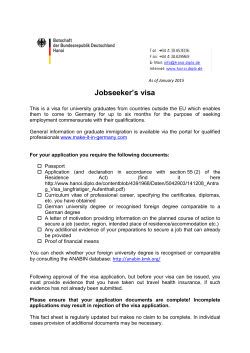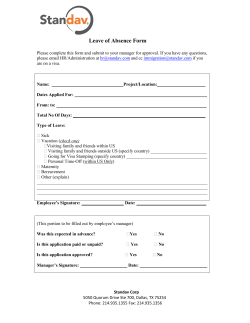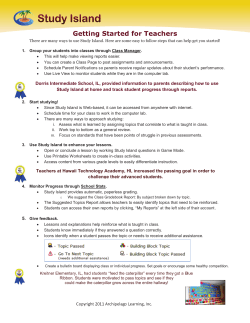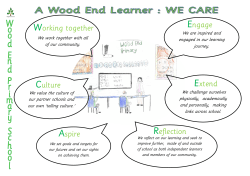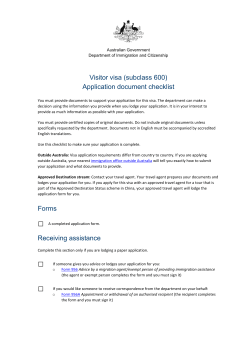
Leadership in Mental Health: Island Nations PDF
Since 2008 Goa has been the site of the Leadership in Mental Health (LMH) course auspiced by Sangath, an Indian mental health NGO (sangath.com) with support from the London School of Hygiene & Tropical Medicine (www.lshtm.ac.uk). That course has inspired workers from low and middle income countries around the world. For the first time, a tailored version of this course will be held in Cairns, Australia, with a view to addressing the particular issues of Australia’s neighbouring island nations. It will be coordinated with the sixth in the Creating Futures series of conferences - Creating Futures 2015: Practice Evidence and Creativity in Tropical and Remote Settings (cf15.conorg.com.au). Creating Futures 2015: Practice Evidence and Creativity in Tropical and Remote Settings will be held in Cairns city from May 11 to 14, 2015. The Leadership in Mental Health: Island Nations Course will overlap Creating Futures and run for one week – Monday, May 11 to Sunday, May 17, 2015 – with the first day hosted by Gurriny Yealamucka at the Indigenous community of Yarrabah, 60 kilometres from Cairns, the next three days at the conference venue (Shangri-La Hotel, Cairns) and the following three days at James Cook University. Conference plenaries are all relevant to course objectives and there will be a designated stream during parallel sessions for course participants through the conference itself. The Leadership in Mental Health: Island Nations Course has been designed to meet two key objectives: 1. To equip participants with the methods to develop effective interventions for people with mental disorders, and approaches to supporting mental health and wellbeing in low resource settings, and: 2. To enhance leadership skills needed to scale up health care programs and promote the human rights of people affected by mental disorders. This course builds capacity to meet the goals for the Movement for Global Mental Health (globalmentalhealth.org) and the Lancet series on Global Mental Health 2007. The course is designed for workers from settings in which resources are scarce and who are committed to improving care for people experiencing mental health disorders at a population level. Clinical expertise is not necessary but a commitment to promoting human rights at a policy and service level is critical. Applicants from Australia’s neighbouring island nations will be prioritised in selection. As the course will involve group work, participants from the same regions or with common interests will be identified through pre-conference correspondence. The Cairns course will be an abbreviated and targeted version of the Goa course one of whose founders, Vikram Patel, will participate during the Creating Futures conference. Formal presentations across relevant content areas will be followed by group work in which implications for leadership in the contexts of participants’ service environments will be explored. Participants will be provided online access to a range of essential readings and relevant resources and will be expected to have read a small number of identified papers. During the course an electronic library of some 400 pdf resources addressing relevant material will also be provided. As part of their application, participants will be asked to prepare a brief presentation of their national or local service context, or to describe a particular mental health priority issue. This will form the basis of a short presentation during the course and as a focus for ongoing group work. Participants (as individuals or groups) will also be asked to complete and document a post-course task that will relate to consideration, adaptation or application of lessons from the course to national or local contexts. With permission, course staff hope to compile these documents as a publication or resource for future courses. Plenary speakers at the Creating Futures conference whose presentations will be integrated into the Leadership in Mental Health: Island Nations Course (in alphabetic order): Charles Gilks Helen Glover Helen Herrman Carol Kidu Jagannath Lamichhane Robyn McDermott Patricia O’Brien Vikram Patel Yutaro Setoya Michael Spencer Graham Thornicroft Harvey Whiteford Jagannath Lamichhane Jagannath has lived with mental health problems since early childhood. He is a mental health rights activist in Nepal and the founder of the Nepal Mental Health Foundation, a not-for-profit, mental health rights organisation based in Kathmandu. Abhijit Nadkarni Abhijit is a Wellcome Trust Clinical Research Fellow at the London School of Hygiene & Tropical Medicine, UK and is currently based in Sangath. He is currently leading projects exploring the long-term outcomes in alcohol use disorders and developing interventions for people with alcohol problems and their family members. Vikram Patel Vikram is a Professor of International Mental Health and Wellcome Trust Senior Research Fellow in Clinical Science at the London School of Hygiene & Tropical Medicine (UK). He is the Joint Director of the School’s Centre for Global Mental Health. He is also the Honorary Director of the Public Health Foundation of India’s Centre for Chronic Conditions and Injuries and a co-founder of Sangath. Rahul Shidhaye Rahul is a Clinical Psychiatrist, with research interest in the social determinants of mental health, integration of mental health in primary care and mental health systems strengthening. He is country Principal Investigator for various Research Program Consortiums such as PRIME, EMERALD and SHARE. Graham Thornicroft Graham is Professor of Community Psychiatry and Head of the Health and Population Research Department, Institute of Psychiatry, King’s College London. He also holds the position of Consultant Psychiatrist, South London & Maudsley NHS Foundation Trust and Director, Health Policy and Evaluation Institute, King’s Health Partners. Fiona Charlson Fiona holds research positions with the University of Queensland and the Institute for Health Metrics and Evaluation at the University of Washington. Fiona trained in pharmacy and public health and now works as an epidemiologist with the Global Burden of Disease Study, maintaining several international research partnerships addressing mental health in developing countries. Narayan Gopalkrishnan Narayan is the Course Coordinator of Social Work and Human Services at James Cook University. He was the Founding Director of the Centre for Multicultural and Community Development, at the University of the Sunshine Coast, has managed research projects in rural development utilising Participatory Methodologies, and has taught in community development, counselling, mental health, globalisation, social disadvantage, sociology of knowledge, social change, social planning, communication and thought, and social policy. Ernest Hunter Ernest is an Australian medical graduate who trained in adult, child and cross-cultural psychiatry, and public health in the United States before returning to Australia in the mid-1980s. He has worked most of the last three decades in remote Indigenous populations in north Queensland. He is Regional Psychiatrist with Queensland Health working as a clinician in Cape York, and is an adjunct professor with James Cook University. Robbie Lloyd Robbie is a community mental health and disability support reformer, working with all cultures in rural, regional, remote and urban settings. He combines experiential educational development with creative arts-based recovery strategies, to try to put more fun and imagination into healing, growth and development among all ages, cultures and community settings. Janya McCalman Janya is a public health researcher and health promotion practitioner, and has worked in Aboriginal Australian settings for 15 years. Her research interests are Aboriginal empowerment, social determinants of Aboriginal health and wellbeing, and health implementation and evaluation research. Janya has expertise in qualitative research including action research, systematic reviews and grounded theory. Michelle Redman-MacLaren Michelle facilitates participatory, action-oriented public health research in the Pacific and has ongoing projects in Papua New Guinea and the Solomon Islands. As a social worker specialising in community development, Michelle has worked in rural, remote and international settings for over 20 years and has experience in hospital and community health social work, community development, health promotion and NGO management. The definitive timetable will be made available after the program for the Creating Futures Conference is finalised. A maximum of 30 delegates will be accepted into the Leadership in Mental Health: Island Nations Course. Sessions during the Creating Futures Conference will have larger groups. All applicants for the Leadership in Mental Health: Island Nations Course must register for the Creating Futures Conference. Costs are on a sliding scale (high income vs low and middle income countries). Once delegates to the course have been selected, applicants will be informed and will need to pay an additional fee, $AU100 for regular applicants and $AU25 for full-time students, Concession Card holders and LMIC residents applicants LMIC residents are as defined by the World Bank, these include residents of PNG, Timor- Leste and Australia’s island neighbours (excluding New Zealand). Full time students and Concession Card holders are eligible for the concession price. Costs, GST and Tax Invoice All costs are quoted in Australian dollars. 10% GST is included in all costings and can be claimed as a tax credit if you are registered in Australia for GST. A Tax Invoice will be emailed to you on receipt of payment Conference delegates may wish to find their own accommodation but the organisers for Creating Futures Conference will provide a list of hotels in Cairns. However, for Leadership in Mental Health: Island Nations Course delegates only, accommodation at James Cook University will be sought. This is at the campus some fifteen kilometres from central Cairns and minibus transport will be provided to the conference itself. Unfortunately this accommodation is contingent on availability which will not be known until March 2015. The accommodation consists of two bedroom and three bedroom units, each of which has a living room, bathroom and kitchen. There is a communal dining room in which breakfast and dinner are provided. The cost for accommodation and meals is $AUS35 per day. Lunch will be provided for all conference delegates at the conference hotel, and will be provided to course delegates at the course venue. Under Australia’s universal visa system, all visitors to Australia must have a valid visa to travel to and enter Australia (other than New Zealand passport). Therefore, all Leadership in Mental Health: Island Nations Course articipants will need to complete the appropriate documentation for a visa. Applicants from most Pacific Island countries are eligible to apply for an Australian visa online. The appropriate visa category will be a Visitor Visa Subclass 600 which can be found in the business visitor stream at the following site (www.immi.gov.au/services/pages/visitore600-visa-online-applications.aspx). Applicants should ensure that they either have a formal invitation from the conference organisers OR have evidence of completed registration prior to submitting their visa request. Other documents will be necessary (these need to be uploaded onto the visa site at the time of application), and a checklist for required items can be found at www.immi.gov.au/Visas/Pages/checklists/600-business.aspx. Creating Futures 2015 and the Leadership in Mental Health: Island Nations Course have been registered with Australia’s IECN (International Event Coordination Network) and once registrations have been completed participants’ names will be forwarded to relevant visa processing offices to facilitate their application. Applicants for visas are advised to commence the process as early as possible and AT LEAST two months prior to departure. Steps for registration 1. Complete the Creating Futures conference registration on the conference website – cf15.conorg.com.au – the registration document will assist your visa application. You will need to pay the conference registration fee at the time of application 2. The course application form can be downloaded from our website: http://cf15.conorg.com. au/leadership-in-mental-health-island-nations-course/ Once completed please email the form to info@conorg.com.au. If you would like the form emailed to you directly, please contact The Conference Organiser via email. 3. Review and obtain other documentation necessary for visa application at www.immi.gov. au/Visas/Pages/checklists/600-business.aspx 4. Complete visa application at www.immi.gov.au/services/pages/visitor-e600-visa-onlineapplications.aspx 5. When you are informed that your application for the Leadership in Mental Health: Island Nations Course has been successful, If your application is successful we will invoice you for the additional charge, $AU100 for regular applicants and $AU25 for full-time students, Concession Card holders and LMIC resident applicants.. Front cover artwork by Roy McIvor Artist Roy McIvor was born in 1934 and is a Yimithirr Elder living in Hope Vale, Far North Queensland. McIvor offered three silk-screen printed works to be adapted for the Creating Futures 2015 Conference brochures. These works were printed by Editions Tremblay, Cairns, and convey various stages, colours and patterns of the onset of the wet season, from parched earth to burning and the final deluge as expressed in a physically human nature – blood/earth (Bubu Gunbi), sweat/heat (Yuku Ngaala) and tears/rain (Buurraay Milbaal). Website: http://www.canopyartcentre.com/artists/roy-mcivor/ For more information or to submit your application please contact Ellen and Penelope at The Conference Organiser. Mailing Address: 146 Leicester St, Carlton, Victoria. 3053, Australia Ph: (03) 9349 2220 Fax: (03) 9349 2230 Int.: +613 93492220 Int.: +613 93492230 E: info@conorg.com.au Brochure design by George Kirby – george.kirby@outlook.com
© Copyright 2025

